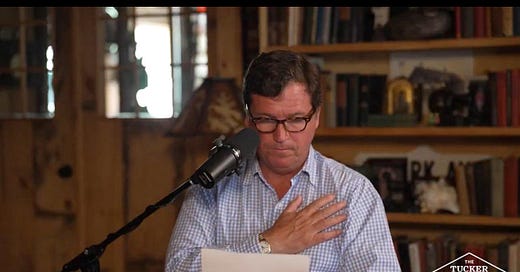Tucker Carlson Lied About the Qatar Air Base—Here’s the Truth
It’s about Afghanistan, Iraq, oil routes, and global power projection—not Jews.
Tucker Carlson falsely claimed today on his podcast that the U.S. Air Force base in Qatar exists solely to "protect Israel." Let's clarify the record: The true reasons behind America's significant military presence in Qatar, particularly at Al Udeid Air Base, have little to do with Israeli defense.
Established in 1996 by Qatar and expanded dramatically after the attacks on September 11, 2001, Al Udeid serves as the strategic heart of U.S. operations in the Middle East and Central Asia. Following 9/11, the U.S. urgently required a reliable, stable, and geopolitically neutral site from which to launch operations into Afghanistan and, later, Iraq. Qatar, positioned ideally at the crossroads of the Gulf, became America's partner of choice.
Contrary to Carlson's distortion, the base's primary role is to oversee and facilitate broader U.S. military objectives in the region, most unrelated to Israel's security. Home to the forward headquarters of U.S. Central Command (CENTCOM), Al Udeid orchestrates operations spanning multiple countries—Afghanistan, Iraq, Syria, Yemen, and beyond. The base is crucial for combating terrorism, securing sea lanes vital to global trade, and responding to humanitarian crises.
However, it is essential to acknowledge that Qatar itself has a problematic record regarding terrorism, having sponsored or provided safe haven to groups affiliated with extremist activities. This complicated reality underscores that the U.S.-Qatar relationship, far from ideal, is rooted deeply in strategic necessity and practical advantage rather than shared values or flawless diplomacy.
Qatar's substantial investment—over $8 billion—in building and maintaining Al Udeid significantly reduces America's defense burden, another practical reason for its establishment and continued use. Additionally, Qatar's diplomatic neutrality, despite its troubling ties, allows the U.S. a degree of operational freedom rarely found elsewhere in the region.
Importantly, Al Udeid hosts critical multinational assets, including the British RAF’s 83 Expeditionary Air Group, emphasizing its role in international security rather than narrow regional interests. The base’s recent targeting by Iran further underscores its strategic importance in broader geopolitical dynamics rather than any singular nation’s defense.
It is interesting, if troubling, that Carlson would frame the base as exclusively serving Israeli interests—almost as if every geopolitical issue must somehow trace back to blaming Israel or the Jews. America's strategic calculus in Qatar is rooted deeply in a long-term vision for regional stability, anti-terrorism operations, and the maintenance of crucial global logistics and trade pathways—not merely in protecting any single ally, including Israel.
In short, the American presence at Al Udeid is guided by strategic necessity and pragmatic cooperation with Qatar, shaping regional security far beyond Carlson's reductionist falsehoods. Understanding these genuine motivations is vital, lest misinformation shape public perceptions of critical U.S. foreign policy decisions.





